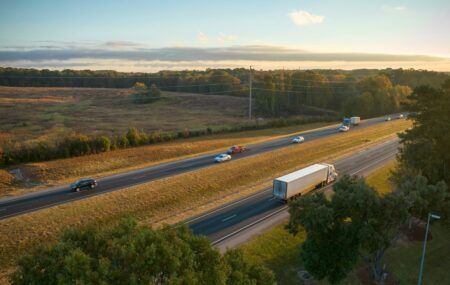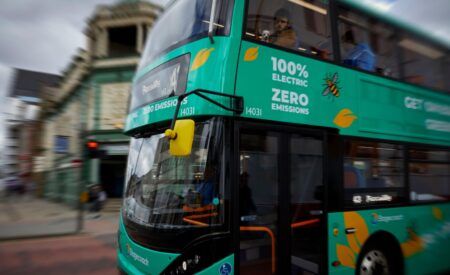London Mayor Sadiq Khan has unveiled the world’s first double-decker hydrogen-powered bus, as he committed to phasing out purchasing any new ‘dirty’ pure-diesel buses for the UK capital.
Khan revealed that no more pure-diesel double-deck buses will be added to the capital’s fleet from 2018, and that all new single-decks for central London will be zero-emission. It is estimated that the equivalent of 9,400 premature deaths occur each year in London, due to illnesses caused by long-term exposure to air pollution, and diesel vehicles are recognized as a major contributor to pollution and associated health impacts.
The new hydrogen double-decker is at the forefront of green technology and will be trialed on London’s roads next year. It is made by leading UK bus manufacturer Wrightbus, and forms part of the Mayor’s plan to transform the capital’s bus fleet by phasing out the oldest and most polluting diesel buses, and making the entire fleet ultra-low or zero emission. At least 20 new hydrogen buses will be delivered as part of a £10m (US$12.6m) part-EU funded project supporting hydrogen technology, with Transport for London (TfL) providing at least £5m (US$6.3m) in funding.
The Mayor unveiled the new bus as he and Deputy Mayor of Transport Val Shawcross met with international city officials, bus manufacturers, financiers, and technology providers, attending an International Zero-Emission Bus Conference and Summit at City Hall. Khan is calling on other cities to follow London’s lead, and work together to challenge bus manufacturers to produce more zero-emission buses and make cleaner bus technology cheaper.
Eleven other major cities, including New York, Los Angeles and San Francisco (USA), Amsterdam (Netherlands), Copenhagen (Denmark), and Cape Town (South Africa), have already responded to the call and agreed to begin moves to phase out their procurement of pure diesel buses by the end of 2020. In addition, Paris (France), Madrid (Spain) and Mexico City (Mexico) have committed to removing diesel buses from their cities by 2025. Together these cities have committed to procuring 1,000 zero emission buses, using either electric or hydrogen technology, over the next five years.
“I want London to become a world leader in hydrogen and electric bus technology. I’m implementing hard-hitting measures to clean-up London’s toxic air and it’s great that more cities are getting on board to phase out the procurement of pure diesel buses, which sends a clear signal that only the cleanest technologies are wanted in our cities,” said Khan.
“Transforming London’s bus fleet by accelerating the introduction of zero-emission buses is important and I plan to work with bus manufacturers, other cities, the European Commission, and the C40 Climate Change Leadership Group of Cities, to move this agenda forward.”
The EU Transport Commissioner, Violeta Bulc, attended the conference and said, “European cities are global frontrunners, and I encourage all cities to make use of European funding opportunities to support this transition. Therefore, we are developing a deployment initiative for clean buses at European level, including a platform to better align planning and investment.”




